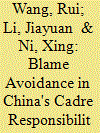| Srl | Item |
| 1 |
ID:
181136


|
|
|
|
|
| Summary/Abstract |
This article contends that prior research on the behaviour of Chinese local cadres pays limited attention to their motivation for avoiding blame. Using qualitative data from three field studies conducted in Guangdong province, the study focuses on blame avoidance in the cadre responsibility system, which is recognized as an important instrument for state capacity building. Our analysis uncovers three major discursive strategies used by grassroots cadres to manage blame either before or after it is apportioned: de-legitimating performance standards, re-attributing blame and transferring blame risk. We find that local cadres have a role as blame makers in shifting blame and accusations. This finding challenges the conventional view, which typically sees local officials as blame takers. The article concludes by elaborating on the wider implications of this finding and proposing avenues for future research.
|
|
|
|
|
|
|
|
|
|
|
|
|
|
|
|
| 2 |
ID:
153406


|
|
|
|
|
| Summary/Abstract |
The rise of ‘rights talk’ in Chinese contentious politics attracts numerous attentions and debates. Does it indicate the rise of citizens’ ‘rights consciousness’ and the retreat of the state, or the continuation of the mass’s ‘rules consciousness’ and the state’s control? Based on a discursive analysis to a wide variety of texts during a ten-year struggle for pension rights, I argue that the discourses used by the protesting workers depended on concrete contexts and power relations, and the institutional design from the state promoted the workers’ rational justification to their interest requests. The strategic employment of ‘rights talk’ by the workers, on one side, displayed the state’s symbolic domination, which successfully prevented the radicalization of protests; on the other side, it suggested that only through the realization of ‘rule of law’ could the state’s management of social contentions turn from short term containment to long range institutional absorbing.
|
|
|
|
|
|
|
|
|
|
|
|
|
|
|
|